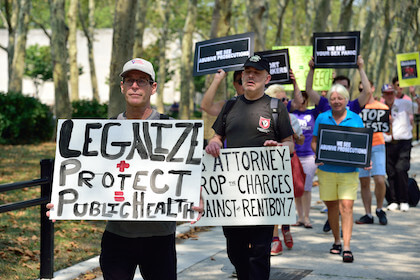Once the Canadian Supreme Court overturned criminal laws surrounding prostitution last December, it was a foregone conclusion that the Parliament controlled by the Conservative Party would recriminalize it. The party has now made its proposal, which is being widely criticized for enshrining the harms the high court identified in making its historic decision.
Two separate judicial decisions rejecting Canada’s prostitution laws have been written by women, including Canada’s longest serving chief justice, Beverly McLachlin. The rulings were prompted by the sorry history of violence toward women participating in sex work. Recognizing the male violence that women sex workers face worldwide, the Canadian courts concluded that the just solution was to empower women to protect themselves.
Under the Canadian Charter, all citizens have a right to “personal security,” but prostitution laws infringed on this right by prohibiting sex workers from hiring security guards, establishing indoor locations, and communicating and negotiating agreements with customers. The laws effectively prevented sex workers from screening clients for a “propensity to violence.”
The high court did not legalize prostitution, it simply accepted its existence and asked what can be done to improve the safety of sex workers. The journey from trial to the unanimous Supreme Court decision gave anti-prostitution groups, including those representing feminists and law enforcement, a full opportunity to present their case — one that was decisively rejected.
The Supreme Court suspended its decision for a year to give Parliament time to consider the options. There was no obligation to move quickly, and lawmakers could have reacted calmly by saying, “Wait, let’s see what actually happens.” Instead of imagining problems, they could have drafted new laws responding to actual problems stemming from decriminalization.
Instead, the Conservatives jumped in, casting their lot unambiguously with groups whose views were fully aired before the Supreme Court and rejected. They chose an approach that engenders some popularity because, on its face, it seems to be a compromise: legalize the sale of sex but punish its purchase. They purported to sympathize with the victims — women — and to punish men who victimize women with money and coercion.
To be sure, women are sharply divided on this issue, but those who advocate a harm reduction approach — recognizing the realities of a situation and minimizing the bad outcomes — condemned the Conservatives’ proposal, arguing it would keep women sex workers in danger.
Meanwhile, groups whose animosity to prostitution is undisguised hailed the measure. The Evangelical Fellowship of Canada was pleased, saying, “This means that a sex buyer’s conduct is illegal wherever it occurs — whether on the street, in a private residence, massage parlour, or similar venue. The legislation backs this up with significant fines and potential jail sentences that will have a real deterrent effect.”
Significantly, the proposal is more prohibitionist than current law, which permits commercial sex in private homes.
Conservatives themselves argued their approach would “reduce demand for prostitution, deter participation, and ultimately abolish it, to the extent possible.”
Abolition is to prostitution laws what a drug-free world is to prohibition — the ultimate objective. But where there is a willing buyer and a willing seller — be it with drugs or sex —condemned practices endure, despite censure.
Other reformers aim to reduce the harm that these enduring practices cause.
In an open letter, 221 attorneys, activists, professors, and intellectuals protested the Conservative initiative. The half step of legalizing the sale, but criminalizing the purchase, they asserted, repeated the mistakes of the old laws and would keep sex workers in danger. They decried a bill that would “limit the practical ability of sex workers to screen their clients or negotiate the terms of the transaction.” The bill creates “barriers to police protection” and prevents the operation of “safe indoor space” because clients might be arrested.
A former hooker, Christine Wilson (it’s a pseudonym), called the legislation a sham. If sex workers can’t advertise, she wrote in the Toronto Globe and Mail, “That leaves one option — alone on the streets.”
She scoffed, “The government wants you to believe that women in the sex trade will not be treated as victims, and the johns will be viewed as the predatory perverts they have always been. Don’t think for a moment that these women are really being seen as innocent victims. The government has left itself plenty of room to prosecute hookers when it chooses. It will still be illegal to communicate for the purposes of prostitution, illegal to work on residential streets or anywhere a minor might stumble upon you. They have left themselves a back door to arrest their own victims when it suits them.”
Even the Conservative Party’s libertarian wing was dismissive of the new proposal. John Flanagan, a prominent public intellectual and former aide to Prime Minister Stephen Harper, accused the party of creating “a moral panic.” In a pessimistic mood, he wrote in the Globe and Mail, “The signs are worrisome. Conservative MPs are talking darkly about pimps in schoolyards. The Minister of Justice has started to create a new class of folk devils by calling the customers of prostitutes ‘perverts.’”
“Most alarming,” added Flanagan, a longtime political science professor at the University of Calgary, is the bill’s “potential to reunite the coalition of radical feminists, social conservatives, and law-enforcement authorities that gave us the triple moral panic of the 1980s over imaginary sexual abuse of children: satanic abuse in child-care centres, repressed-memory syndrome, and pedophile rings. Families were shattered and people were sent to jail, mainly in the US but also in Canada, for having committed implausible or even impossible sexual offences. Radical feminists wanted to strike at male domination of women and children, social conservatives were worried about sexual permissiveness, and law-enforcement authorities were pioneering new methods of investigation and interrogation. It was a potent combination.”
Political parties that seek to govern a nation have a moral obligation to prevent contagions of unfounded fear in society. The Conservatives’ bill provokes controversy rather than consensus. And when enacted, the new law will certainly return to Canada’s Supreme Court, where a sex worker’s right to personal security is guaranteed. To no good effect, the issue will have gone full circle.

































